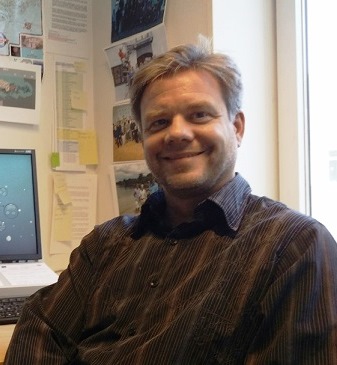Interview with senior researcher Hans Sanderson: Start writing your proposal well in advance - it increases your chances of an EU grant
Hans Sanderson, senior researcher at the Department of Environmental Science, has been the coordinator of an FP7 cooperation project "BASE", which was finalized in 2016. He passes on advice that will benefit any applicant for Horizon 2020 funds.

The consortium must be in place "Start writing your proposal early!” That is the advice of Hans Sanderson. "We got the early drafts of the work programme featuring the expected topics a full year before the deadline for our BASE proposal. We got them by roundabout methods; they circulate around the entire environment, and it is a good idea to get access to them in one way or another." Hans Sanderson explains that when building a consortium, you should take the lead of a small core team to avoid having to do all the work on your own. Then you have to start calling and writing to those that you believe could be valuable to your consortium and your project. It can be people you know from conferences, or from activities of other EU partnerships or from previous projects. According to Hans Sanderson this is where you need to be well in advance of everyone else: "There is a great demand for people, so if you wait several months before asking them to dance, they will already be dancing with someone else".
"For this kind of projects, it's not so much about joining forces with the most distinguished researchers. It is more about the “workability” and about joining forces with someone who can and will work. The enthusiasm of youth will compensate adequately for the lack of experience". However, it is important that the institutions are outstanding. The project officers in the Commission must be able to see that excellent and solid institutions form the consortium.
Writing a proposal requires "commitment"
"Even though such a proposal ends up as a fearsome heap of paper, I still think the proposal must be as well prepared as at all possible. Then your chances are fairly good. It is of no use just sending something off and then crossing your fingers. That won’t work today: "If you fail to prepare - you prepare to fail", Hans Sanderson says and continues: "The starting point of it all is my own general idea for a proposal.
One of the challenges is to preserve the main idea and at the same time to accommodate various details and practical solutions with hours allocated, etc. Therefore, to begin with, you spend a lot of time just getting people on board and making them understand what it's all about, and making them commit themselves to the idea.”
The companies need to be included
"In my experience professional and industrial bodies provide an excellent approach to companies and a help to including the companies in the project. Such bodies are good at approaching the companies at the appropriate strategic level." We have worked with e.g. CDP (Swedenergy Carbon Disclosure Project) who is in contact with 5000 companies and is also "World Business Council for Sustainable Development". This council has 200 member businesses, and the group is managed by the CEOs of the companies, so they are very efficient.
Being the coordinator is an excellent opportunity
To be the coordinator is primarily to be an administrator. Taking on this role is a clever option when you are not necessarily the expert in the area. "I am dependent on the other members of the consortium, and they must be allowed to do things their own way. It is easier to make room for that when you are not the expert. To me the project is successful when it runs smoothly and according to the plan, when deliverables are made on time, when reports are handed in on time and when the money is spent".
"Furthermore, I am the contact to the Commission and I consider that a customer relationship. The European Commission is my client and as with any other client, I must provide service to them. It's all about response time and about treating people with respect and trying to ensure that they are comfortable with what you are doing. They like that. I have excellent relationships with several officers of the European Commission now. I see myself as a kind of 'contractor' for the Commission. It is important for them to know what I do and who I am, and you need to allow them get to know you".
"Even though I am not carrying out the main part of the research in the project, I still have the scientific room that I need, and I am actually able to publish quite a bit and I also regularly make presentations even though I have no research time on the project."
And finally:
"Just make room and let go, otherwise it is not a cooperation. You have to give something to get something in return; show generosity. You can do that e.g. by treating them to a nice dinner and generally by making sure that the project and the environment is pleasant and nice. People are human; we are not robots. It's no use just looking at how many person months you have on the project. You need to be able to think: "I'm part of something great together with some friends with whom I collaborate. And of course I try to do my best." That is the mindset that you should encourage in such projects".
You can read more about the project here.
Read more about advice on EU proposals as well as on the possibility to buy experienced project management from the Research Support Office here.